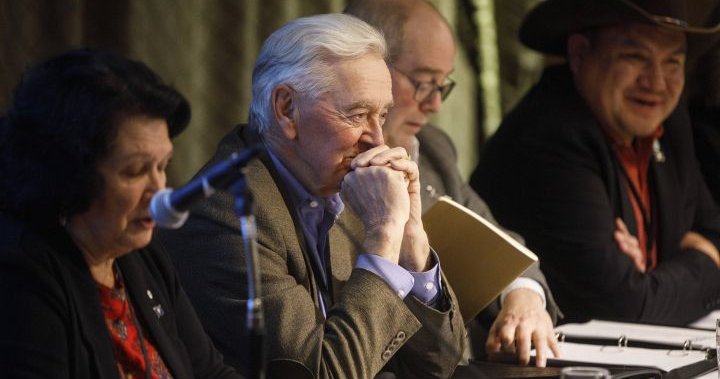A panel reviewing Alberta’s COVID-19 response is calling for rule changes to ensure the province’s premier and cabinet have the last word in future crises, with help from a new senior science officer.
Former Reform Party leader Preston Manning, who chaired the panel, says a senior science officer could create a roster of experts from medicine, social sciences, psychology and law to advise on decisions and their potential effects.
The report puts forward more than 90 recommendations on how Alberta can better prepare rules, regulations and its organizational structure to deal not just with future pandemics, but any emergency.
The core recommendation is that all provincewide emergencies are to be directed by cabinet and implemented through the Alberta Emergency Management Agency.
In future pandemics or health crises, Alberta Health Services would be called on to make recommendations related strictly to health matters, but government would make all decisions through the emergency agency.
The report urges the government to spell that out in new legislation.

Premier Danielle Smith appointed Manning to chair the panel, and he was given the ability to pick the other panel members, subject to approval by Smith.
Smith said that Manning and the panel were to take feedback virtually from experts and the public, then issue a final report and recommendations by Nov. 15.
The panel was tasked with not only looking at government decision-making, but also its effects on jobs, children, mental health and protection of rights and freedoms.
Smith’s spokesperson, Becca Polak, said the bulk of the panel’s work will be document review of legislation, regulations and ministerial orders, but “the panel will consider public submissions made through the web page.”
“The specific task of the panel would be reviewing the Alberta statutes that informed and authorized the government’s response to COVID-19.”

The panel’s budget is $2 million, and Manning is to be paid $253,000.
This is the second time Manning has been involved in a COVID-19 inquiry.
Last November, he announced plans for a citizen-led and funded cross-country inquiry into the effects of Canada’s response to the pandemic.
Polak said Manning would step aside from his role at the National Citizens Inquiry to avoid any conflict of interest.

Manning and Smith have been critical of government-imposed health restrictions such as masking, gathering rules and vaccine mandates during the pandemic.
Smith has questioned the efficacy of the methods and their long-term effects on household incomes, the economy and mental health. She has promised health restrictions and vaccine mandates will have no role in any future COVID-19 response in Alberta.

When the panel was first announced, Lori Williams, a professor of policy studies at Mount Royal University, said it’s legitimate to have a review in order to better deal with future health crises. However, she said she believes the chair selection is not neutral.
“It’s not impartial. It looks like it’s furthering or driving an agenda rather than engaging in an inquiry into what legitimately should be looked at and improved for the future,” she told Global News on Jan. 19.
“Normally, what you’d do is pick somebody — say, a retired judge or someone who’s seen as a well-informed, neutral party — who’d be looking at a number of different perspectives and arguments for how to improve dealing with this sort of thing in the future,” Williams said at the time.
“That’s not what we have in Preston Manning. He’s very much looking for — he’s said this publicly — he’s looking for people who’ve been harmed by the policies. He’s interested in looking for, and this is a quotation, ‘expert testimony … particularly from those whose alternative medical narratives or alternative scientific narratives were ignored or even censored during the time of the pandemic.’
“It looks like he has a bias here, he has an agenda here. He’s not a neutral arbiter. He’s not going to be viewing things from an objective perspective.”
More to come…
–With files from Global News’ Emily Mertz
© 2023 The Canadian Press

